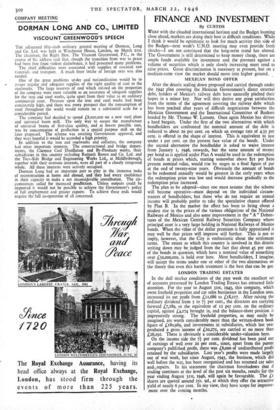FINANCE AND INVESTMENT
By CUSTOS
WHAT with the clouded international horizon and the Budget looming close ahead, markets are doing their best in difficult conditions. While I think it would be optimistic to look for much activity this side of the Budget—next week's U.N.O. meeting may even provide fresh shocks—I am not convinced that the long-term trend has altered. The Government is still determined to keep money cheap, there are ample funds available for investment and the pressure against a volume of securities which is only slowly increasing must tend to raise prices. Great discrimination is necessary at present, but on a medium-term view the market should move into higher ground.
MEXICAN BOND OFFER
After the drastic scaling down proposed and carried through under the 1942 plan covering the Mexican Government's direct external debt, holders of Mexico's railway debt have naturally pitched their hopes in a minor key. Nor will they derive any great satisfaction from the terms of the agreement covering the railway debt which has been reached after years of difficult negotiations between the Mexican Government and the International Committee of Bankers headed by Mr. Thomas W. Lamont. Once again Mexico has driven a hard bargain. Under the first of the two alternatives with which bondholders are confronted the nominal amount of the debt is reduced to about 20 per cent. on which an average rate of 4.35 per cent. is offered in the shape of interest. This is equivalent to just under t per cent. on the present face value of the bonds. Under the second alternative the bondholder is asked to waive interest from January I, 1946, onwards, but the same amount of money per bond as is applied under Plan A would be used in the redemption of bonds at prices which, starting somewhat above $21 per $too present nominal value, would rise by stages to a final figure of par at the end of twenty-nine years. Obviously the amount of bonds to be redeemed annually would be greatest in the early years when the redemption price was low and would decrease gradually as the redemption price increased.
The plan to be adopted—since one must assume that the scheme will become operative—must depend on the individual circum- stances of bondholders, but those who do not require an annual income will probably prefer to take the speculative chance offered by Plan B. In the market the effect has been to bring about a modest rise in the prices of the various obligations of the National Railways of Mexico and also some improvement in the " A " Deben- tures of the Mexican Central Railway Securities Company whose principal asset is a very large holding in National Railways of Mexico bonds. When the value of the dollar premium is fully appreciated it may well be that prices will improve still further. This is not to imply, however, that the City is enthusiastic about the settlement terms. The extent to which this country is involved in this drastic writing down may be judged from the fact that about 45 per cent. of the bonds in question, which have a nominal value of something over L5o,000,000, is held over here. Most bondholders, I imagine, will accept the terms under one or other of the two alternatives on the theory that even this harsh treatment is the best that can be got.
LONDON TRADING ESTATES
In the dull market conditions of the past week the excellent set of accounts presented by London Trading Estates has attracted little attention. For the year to August 31st, 1945, this company, which owns freehold properties and car sales businesses in the London area, increased its net profit from £11,686 to £18,117. After raising the ordinary dividend from 5 to 7+ per cent., the directors are carrying forward £7,289, or the equivalent of 12 per cent. on the ordinary capital, against £4,174 brought in, and the balance-sheet position is impressively strong. The freehold properties, as may easily be imagined, are worth considerably more than the written-down book figure of £180,989, and investments in subsidiaries, which last year produced a gross income of £20,271, are carried at no more than £26,292. There is obviously a considerable under-valuation here.
On the income side the 7+ per cent. dividend has been paid out of earnings of well over 20 per cent., since, apart from the parent company's published profit, there was £6,000 of undistributed profit retained by the subsidiaries. Last year's profits were made largely out of war work, but since August, 1945, the business, which did well before the war, has been reorganised and has resumed car sales and, repairs. In his statement the chairman foreshadows that if trading continues at the level of the past six months, results for the year ending August 31st, 1946, will again be favourable. The LI shares are quoted around 25s. 9d., at which they offer the attractive yield of nearly 6 per cent. In my view, they have scope for improve- ment over the coming months.






























 Previous page
Previous page